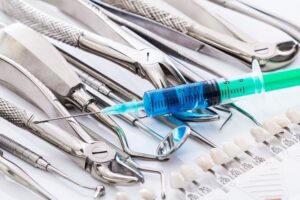How does local anesthetic work?

One of the greatest advancements in modern dentistry is the use of local anesthetic to keep patients comfortable and treatment painless.
If you’re curious about how it works, here’s a short explanation of the science behind local anesthetic and how it keeps dental procedures and oral surgery safe and pain-free.
Blocking the signal from nerve to brain
When a nerve senses a painful stimulus to the body it sends a signal to the brain to register the sensation. As your brain processes the pain, it alerts you to stop the action or avoid similar situations in the future. Local anesthetic prevents nerves from sending this message. Anesthetic is applied as close to the treatment area as possible, to ensure that the right signal channels are blocked.
A short history of local anesthetic
The earliest form of local anesthetic was derived from the coca plant. Known as cocaine, this is the only natural-based anesthetic discovered to date and all future synthetic versions of the compound are based on the original formula.
One of the original synthetic compounds was called Novocaine, short for “the new cocaine” and many patients believe they’re being given Novocaine in the dentist’s chair. However, the most commonly used local anesthetic today is Lidocaine, which was discovered in the late 1940s.
A temporary solution
A benefit of local anesthetic is that your body can process the medication naturally and gradually return to its normal state without any intervention. As the anesthetic is broken down, you will slowly regain feeling in the affected area.
Duration of effect is determined by the amount and type of anesthetic administered. There are different compounds for short, intermediate and long-acting anesthetics, ranging from 45 minutes to four hours or more.
Added benefits of local anesthesia
Using local anesthesia over general anesthesia comes with several benefits:
- Faster recovery time
- Less postoperative discomfort
- Easier to monitor the patient during the procedure
If you have any questions or concerns related to local anesthetic, be sure to ask your oral surgeon during your initial consultation.






